A medical certificate is an essential document for individuals seeking a career in the aviation industry. Issued by the Federal Aviation Administration (FAA), a medical certificate is an official health document that determines an individual’s fitness to perform their duties as a pilot or other aviation professional. To obtain a medical certificate, aspiring pilots must undergo a thorough medical examination conducted by an aviation medical examiner (AME).
The medical examination assesses various aspects of an individual’s health, including their medical history, physical condition, and specific health conditions that may impact their ability to operate an aircraft safely. The examination is crucial as it ensures that individuals meet the medical standards set forth by the FAA and are fit to hold a medical certificate.
Key Takeaways:
- A medical certificate is required for individuals pursuing a career as a pilot or working in the aviation industry.
- The FAA is responsible for issuing and regulating medical certificates.
- The medical examination is conducted by an aviation medical examiner (AME) and assesses various aspects of an individual’s health.
- Different classes of medical certificates exist, such as first-class, second-class, and third-class.
- Meeting the medical standards set by the FAA is necessary for obtaining and renewing a medical certificate.
Overview of Medical Certification Process
The process of obtaining a medical certificate involves a comprehensive medical examination conducted by a FAA-designated aviation medical examiner. This examination ensures that applicants meet the required medical standards set by the Federal Aviation Administration (FAA) and are fit to hold a medical certificate.
The FAA-designated aviation medical examiner follows a comprehensive medical examination checklist to ensure that all necessary aspects of the applicant’s health and medical history are assessed. This checklist helps in evaluating the individual’s fitness to operate an aircraft safely.
During the examination, the aviation medical examiner assesses various aspects of the applicant’s health, including cardiovascular health, vision, hearing, mental health, and general physical condition. The examiner may also inquire about any medical conditions or treatments the applicant has undergone.
Applicants are required to provide all necessary documentation and medical history to the aviation medical examiner to obtain their medical certificate. This may include medical records, previous test results, and information about any medications or treatments they are currently receiving. The aviation medical examiner reviews these documents to gain a comprehensive understanding of the applicant’s medical condition.
The medical examination is crucial to determine if the applicant meets the required medical standards. If the applicant meets all the necessary criteria, they are deemed fit to obtain their medical certificate. However, if any health concerns or conditions are identified during the examination, further evaluations or medical documentation may be required before the aviation medical examiner can issue the medical certificate.
It is important for applicants to be transparent and provide accurate information during the medical examination. The comprehensive evaluation ensures that individuals who hold a medical certificate are capable of performing their duties safely, minimizing any potential risks related to their health conditions.
| Step | Description |
|---|---|
| 1 | Applicant provides necessary documentation and medical history |
| 2 | Federal Aviation Administration (FAA)-designated aviation medical examiner reviews the documentation |
| 3 | Aviation medical examiner conducts a comprehensive physical examination |
| 4 | Examiner evaluates cardiovascular health, vision, hearing, mental health, and general physical condition |
| 5 | Further evaluations or medical documentation may be required if any health concerns are identified |
| 6 | If the applicant meets the required medical standards, the aviation medical examiner issues the medical certificate |
Different Classes of Medical Certificates
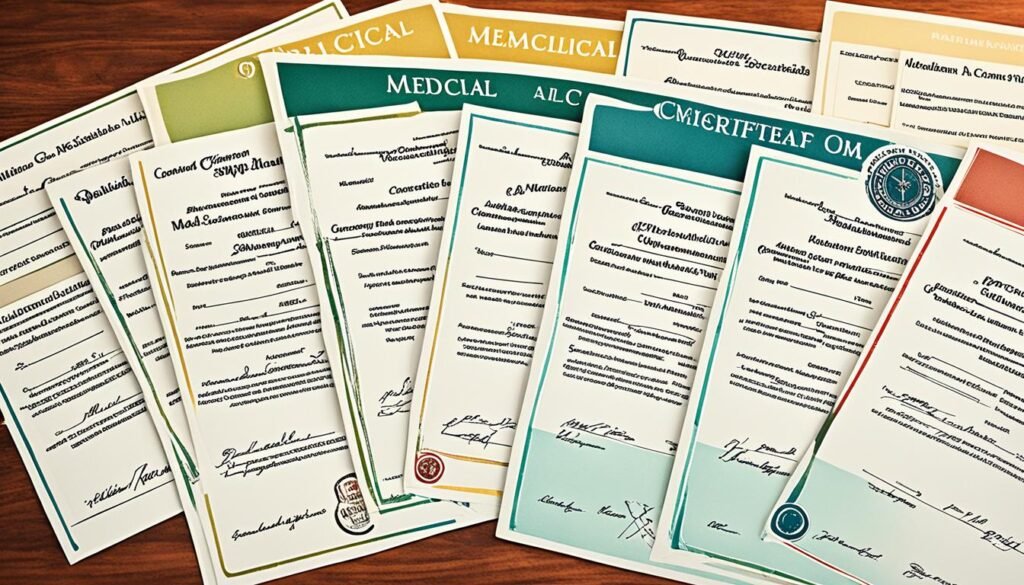
Medical certificates for pilots are categorized into different classes based on the level of certification required for specific aviation operations. These classes ensure that pilots meet the necessary medical standards to safely operate aircraft.
- First-Class Medical Certificate: This class of medical certificate is necessary for pilots who operate airline transport aircraft. It is the highest level of certification and requires pilots to undergo a comprehensive medical examination to assess their fitness to fly.
- Third-Class Medical Certificate: Commonly obtained by private and student pilots, the third-class medical certificate allows individuals to fly for personal and non-commercial purposes. It requires a less stringent medical examination compared to the first-class certificate.
Pilots may also need to fulfill additional requirements specific to their class of medical certificate. For example, some pilots pursuing a first-class certificate may be required to complete a medical education course to enhance their understanding of relevant medical topics.
A visual representation of the different classes of medical certificates can be seen below:
Understanding the different classes of medical certificates is crucial for pilots as it determines the scope of operations they are qualified to undertake. It is essential to consult with relevant aviation authorities and medical professionals to ensure compliance with the specific requirements for each class of medical certificate.
Medical Standards and Health Requirements
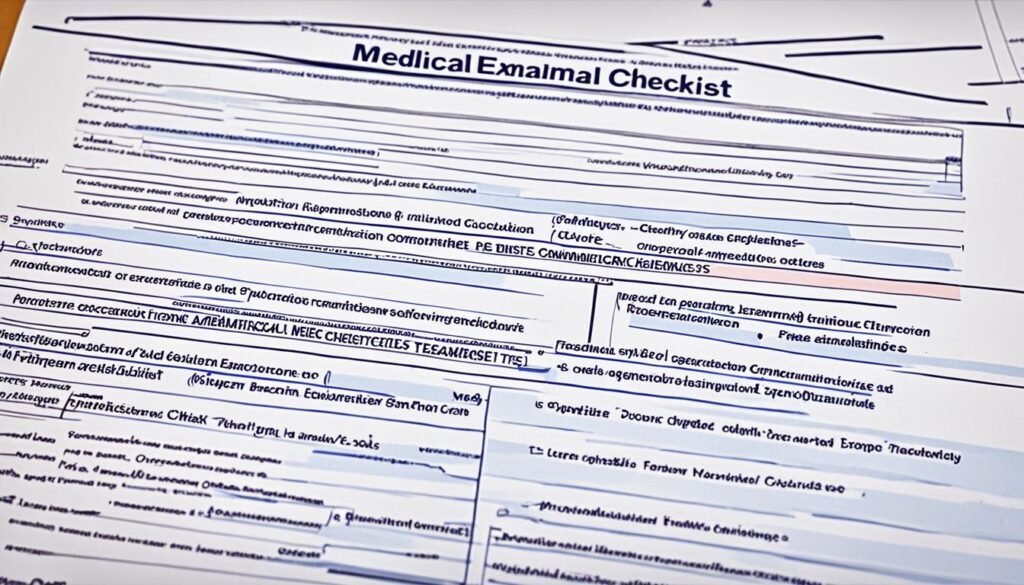
Pilots seeking to obtain a medical certificate must meet specific medical standards and health requirements set by the FAA. These requirements are outlined in a comprehensive medical examination checklist provided by the FAA airman medical division. Meeting these standards is essential for pilots to receive a medical certificate, allowing them to fly legally and safely.
There are different types of medical certificates, including the third-class and second-class medical certificates. The third-class medical certificate is commonly obtained by private pilots and student pilots, while the second-class medical certificate is required for commercial pilots and certain other aviation roles. Pilots may also aim to obtain a first-class medical certificate, typically necessary for airline transport pilots.
The medical requirements for each class of medical certificate vary, with more stringent standards for higher classes. The FAA’s comprehensive medical examination checklist provides detailed guidelines regarding physical health, mental well-being, and specific medical conditions that can impact a pilot’s ability to operate an aircraft safely.
Comprehensive Medical Examination Checklist
The comprehensive medical examination checklist includes various health assessments and screenings that pilots must undergo. These assessments encompass physical examinations, vision tests, hearing tests, cardiovascular evaluations, and psychological evaluations. Additionally, pilots may need to provide adequate documentation concerning their medical history, ongoing treatment, and any past surgeries or medical conditions.
| Type of Medical Certificate | Specific Medical Requirements | Other Health Requirements |
|---|---|---|
| Third-class Medical Certificate |
|
|
| Second-class Medical Certificate |
|
|
| First-class Medical Certificate |
|
|
Pilots who do not meet the specific medical requirements for their desired class of medical certificate may be disqualified from obtaining a medical certificate. Certain health conditions, such as uncontrolled cardiovascular diseases or significant mental health conditions, can pose potential risks and may result in the rejection of an application for a medical certificate. It is crucial for aspiring pilots to understand the health requirements associated with different classes of medical certificates and seek appropriate medical guidance to address any potential disqualifications.
Obtaining and maintaining a medical certificate is a requirement for pilots in order to ensure their fitness to fly and maintain the safety of passengers and crew. The FAA issues medical certificates to aviators who meet the necessary health standards and requirements, allowing them to legally operate aircraft and contribute to the aviation industry.
Applying for a Medical Certificate
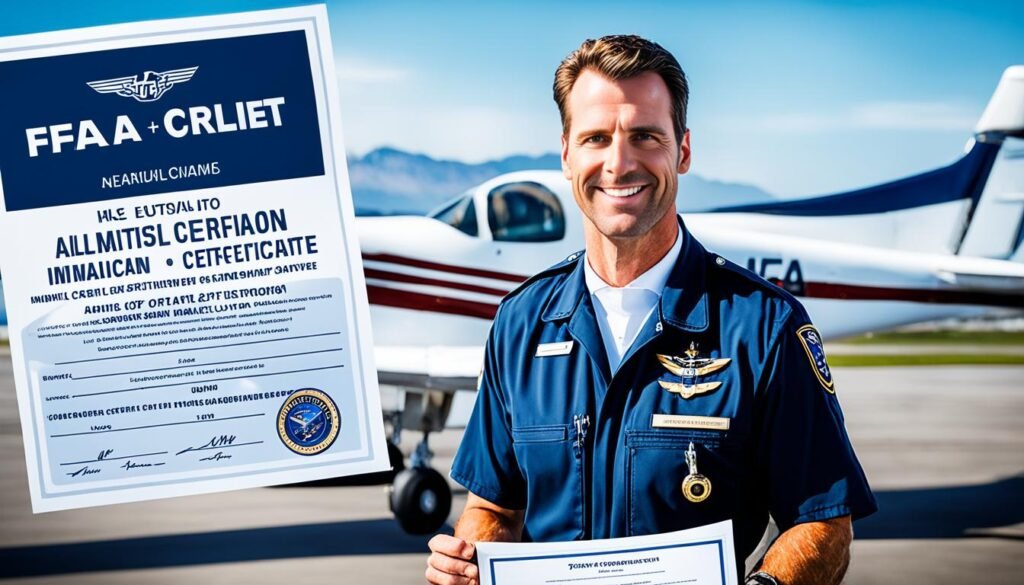
Applying for a medical certificate involves completing the necessary medical examination and ensuring that all required documentation is provided. This examination evaluates an individual’s fitness to fly and their ability to meet the required medical standards. Once the examination is successfully completed, the Federal Aviation Administration (FAA) issues a medical certificate, allowing the individual to pursue their career as a pilot and fly with confidence.
Obtaining a medical certificate is a crucial step for anyone looking to enter the aviation industry or continue their career as a pilot. It demonstrates that the individual has met the necessary medical requirements and is fit to fly. When applying for a medical certificate, it is important to complete the required medical examination, which evaluates various factors such as physical health, medical history, and overall fitness.
“Completing the medical examination is a vital part of the application process for a medical certificate. It ensures that pilots meet the required medical standards and are fit to fly.”
During the examination, the aviation medical examiner (AME) thoroughly evaluates the applicant to ensure they are in good health and suitable for flight operations. This examination may include assessments of vision, hearing, cardiovascular health, and other relevant medical conditions. It is essential to provide accurate and complete medical information during this process to ensure an accurate evaluation.
Required Documentation
Along with the medical examination, applicants must also provide all necessary documentation as part of the application process. This documentation may include:
- Completed application forms
- Proof of identification
- Proof of age
- Medical history records
- Reports from previous medical examinations
It is important to ensure that all required documentation is provided in order to avoid delays in obtaining the medical certificate.
“The application for a medical certificate requires comprehensive documentation, including completed forms, proof of identification and age, as well as medical history records.”
Once the applicant has completed the medical examination and provided all necessary documentation, the FAA reviews the application and issues the medical certificate if all requirements are met. This certificate indicates that the individual has demonstrated their fitness to fly and is ready to embark on their journey as a pilot.
Renewing a Medical Certificate

Pilots need to renew their medical certificates periodically as they expire. A valid medical certificate is required for individuals to continue serving as a flight crewmember. The renewal process involves providing updated medical information and may require individuals to undergo additional examinations. The FAA MedXpress system is used to facilitate the renewal process.
| Renewal Process | Steps |
|---|---|
| 1 | Access the FAA MedXpress system |
| 2 | Provide updated medical information |
| 3 | Submit required documentation |
| 4 | Undergo any additional medical examinations if necessary |
| 5 | Receive renewed medical certificate |
Renewing a medical certificate is essential for pilots to ensure they maintain a valid certification and continue to meet the medical standards required for their role as flight crewmembers. By following the renewal process and providing the necessary information, pilots can ensure a smooth and efficient renewal of their medical certificate.
Requirements for Specific Health Conditions

Pilots must meet specific health requirements, including cardiovascular health, in order to safely operate an aircraft. It is essential for them to be fit to operate an aircraft to ensure the ability to fly safely. Certain health conditions, such as a disease that has been treated or symptomatic or clinically significant conditions, may require individuals to provide additional documentation to demonstrate their fitness to fly.
When dealing with specific health conditions, pilots should consult with an Aviation Medical Examiner (AME) to understand the standards for the class of medical certificate they are seeking. The AME can provide guidance and explain the necessary medical documentation required.
In some cases, individuals with health conditions may need to present a doctor’s note, sick note, health certificate, medical documentation, or physician’s certificate to ensure they meet the necessary standards. This documentation serves as evidence of their ability to fly safely.
It is crucial for pilots to take these requirements seriously and fulfill them accordingly. By doing so, they can demonstrate their fitness to operate an aircraft and ensure the safety of themselves and those on board.
Meeting the Standards for a Class of Medical Certificate
Each class of medical certificate has its own specific standards established by the aviation regulatory bodies. These standards ensure that pilots are physically and mentally capable of performing their duties safely and effectively.
Depending on the class of medical certificate desired, there may be varying criteria to meet. It is important for pilots to thoroughly understand and fulfill the standards for their desired class to obtain the appropriate medical certificate.
Consulting with an AME
The appointment with an Aviation Medical Examiner (AME) is a vital step in the medical certification process. The AME will assess the pilot’s health condition, review medical history, and ensure compliance with the standards for the desired class of medical certificate.
The AME will also provide guidance on the specific health requirements and address any concerns or queries regarding the medical certification process. By consulting with an AME, pilots can ensure they are on the right track to obtaining and maintaining a medical certificate.
Medical Certificates in Other Industries
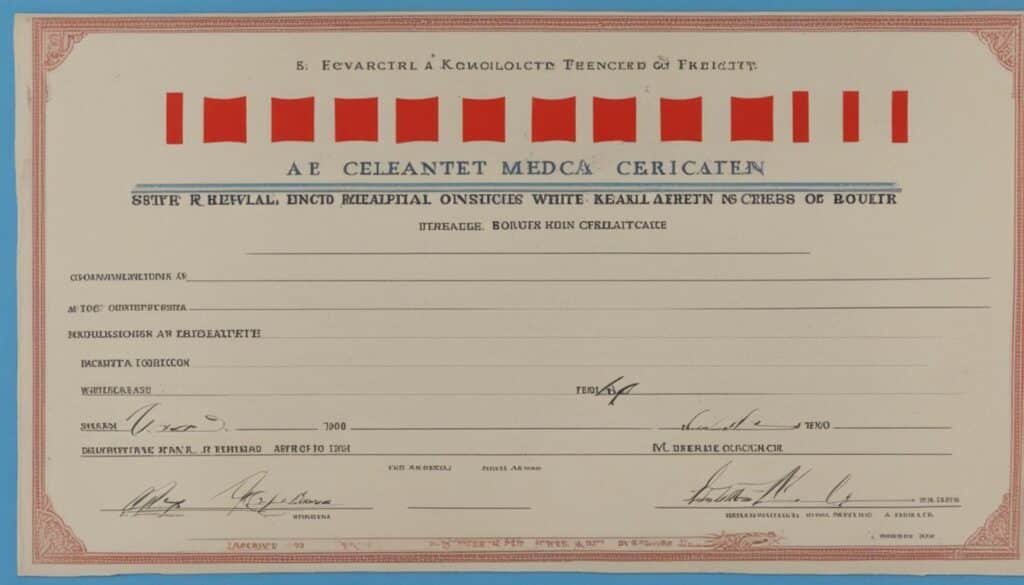
Medical certificates are not limited to the aviation industry; they are also required in various other sectors that prioritize safety and health. One such industry is the commercial pilot sector, where individuals aspiring to become pilots must undergo a comprehensive medical examination and obtain a medical certificate.
The Federal Aviation Administration (FAA) governs the medical certification process for commercial pilots and ensures that applicants meet the necessary medical standards to ensure safe operation of aircraft. Similar to the aviation industry, specific requirements for medical examinations and certificates may vary depending on the industry and the nature of work involved.
“Medical fitness is an essential requirement for individuals working in safety-critical professions, including commercial pilots. It ensures that pilots are physically capable of performing their duties and do not pose a risk to themselves or others.”
Given the demanding nature of their roles, commercial pilots must be in good health and meet specific medical standards to obtain and maintain their medical certificates. These standards may include assessments of cardiovascular health, vision, hearing, and overall physical fitness.
By undergoing thorough medical examinations and obtaining medical certificates, commercial pilots can demonstrate their commitment to ensuring safe flight operations and meeting the necessary health requirements.
Importance of Medical Certificates
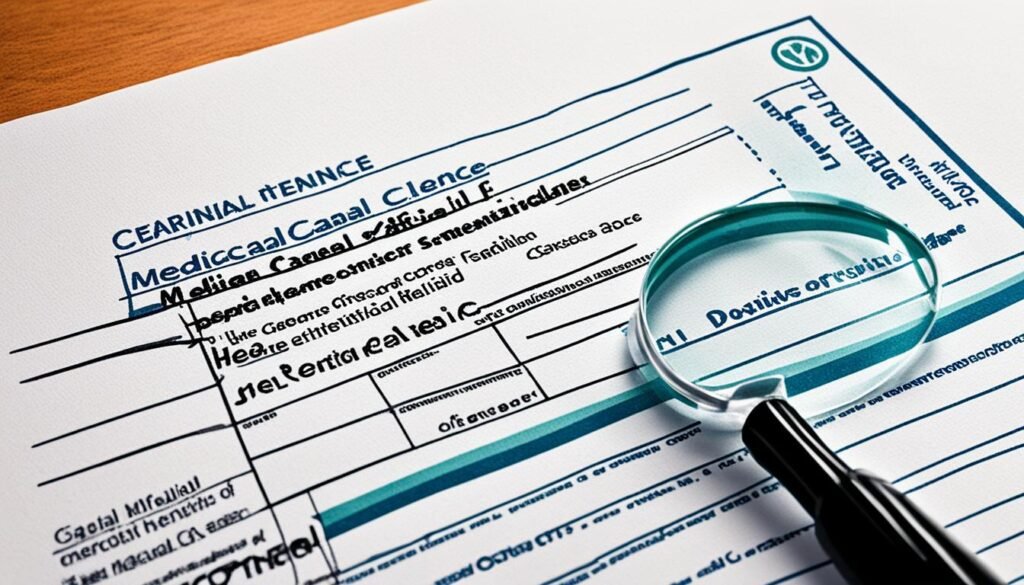
Medical certificates play a crucial role in ensuring the safety and well-being of individuals involved in safety-critical professions, particularly in the field of aviation. Pilots are required to hold a medical clearance and possess a valid medical certificate to ensure their fitness to perform their duties.
Medical certificates come in different classes, each with its own set of stringent medical requirements. These requirements vary depending on the class of medical certificate held by the pilot. The varying levels of stringency in medical requirements help to ensure that pilots are in optimal health and capable of safely operating aircraft.
By implementing strict medical standards, the aviation industry aims to minimize the risk of medical incidents that could compromise flight safety. This includes conducting thorough medical examinations to assess the physical and mental fitness of pilots, as well as to identify any underlying medical conditions that may affect their ability to perform their duties.
Medical certificates are not only important for the individual pilots but also for the passengers and crew who rely on their expertise and professional abilities. By ensuring that pilots meet the necessary medical requirements, medical certificates contribute to maintaining a high standard of aviation safety.
Having a valid medical certificate is not only a requirement for pilots, but it also provides reassurance to passengers and stakeholders within the aviation industry. A stringent medical clearance process helps instill confidence in the abilities and health of pilots, ensuring that they are capable of performing their duties at the highest level of competency.
Overall, medical certificates are a vital component of the aviation field, helping to ensure the safety and well-being of everyone involved in air travel. They serve as a crucial tool in maintaining the highest standards of health and fitness among pilots, thereby enhancing the safety and reliability of the aviation industry as a whole.
Regulations and Oversight of Medical Certificates
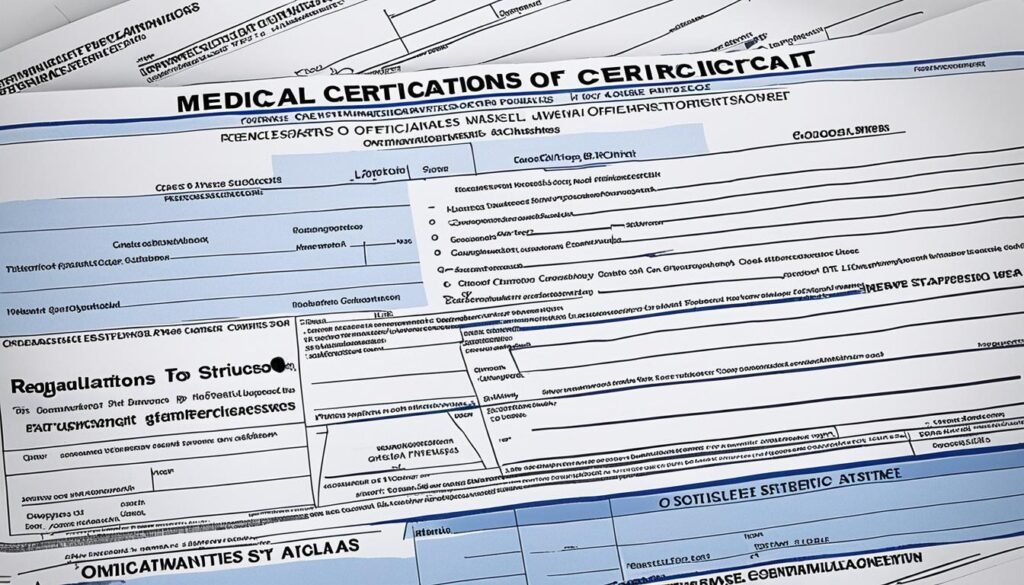
The regulations and oversight of medical certificates are crucial aspects of the aviation industry. The Federal Aviation Administration (FAA) holds the responsibility for establishing the requirements and standards for obtaining different classes of medical certificates. These certificates play a vital role in ensuring the safety and well-being of pilots and passengers alike.
Aspiring pilots aiming for a career in aviation must meet specific medical certification standards. The journey begins with obtaining a second-class medical certificate, which involves a thorough medical examination. This examination evaluates the pilot’s physical and mental health to ensure they are fit to fly.
In addition to the medical examination, pilots must also complete a medical education course. This course provides essential knowledge and insights into the medical aspects relevant to their career as pilots. It equips them with the necessary information to recognize and address any health-related issues that may arise during flight.
Once the aspiring pilot has successfully completed the requirement for a second-class medical certificate and the medical education course, they can progress further in their career. With experience and additional qualifications, pilots can aim to obtain a first-class medical certificate, which holds the highest standard and allows them to fly in various advanced aviation roles.
The regulations and oversight set by the FAA ensure that pilots hold a valid medical certificate throughout their career. Regular check-ups and examinations help maintain the pilot’s health and ensure they are fit to perform their duties. This stringent system of regulations and oversight guarantees the highest level of safety and quality in the aviation industry.
To illustrate the process and requirements, the table below highlights the different classes of medical certificates and the corresponding qualifications:
| Class of Medical Certificate | Qualifications |
|---|---|
| First-Class Medical Certificate | Requires stringent medical standards and qualifications necessary for operating airline transport aircraft. |
| Second-Class Medical Certificate | Requires a comprehensive medical examination and completion of a medical education course, suitable for pilots pursuing a career in commercial aviation. |
| Third-Class Medical Certificate | Requires a comprehensive medical examination and is commonly obtained by private and student pilots. |
By adhering to these regulations and standards, the aviation industry ensures that pilots hold the necessary medical certification to perform their duties safely. These measures play a vital role in maintaining the integrity and safety of the aviation industry and safeguarding the well-being of all individuals involved in air travel.
Also Read: Best Cancer Hospitals in Bangalore
Conclusion
In conclusion, obtaining a valid medical certificate is crucial for individuals pursuing a career as a pilot or working in safety-critical professions. This document is required by the Federal Aviation Administration (FAA) to ensure the fitness of pilots to perform their duties. To maintain their career as a commercial pilot, individuals must renew their medical certificate periodically and stay updated with the FAA’s medical certification requirements.
Renewing the medical certificate is essential to ensure its continued validity. By adhering to the FAA’s regulations and standards, pilots can demonstrate their commitment to safety and professionalism. It is important to understand the specific medical information and requirements associated with each class of medical certificate in order to comply with the FAA’s guidelines.
Aspiring pilots should seek a clear understanding of the medical certificate process and its importance. By actively managing their medical information and keeping their certificates valid, individuals can confidently pursue their career as a commercial pilot and contribute to the safety and well-being of the aviation industry.
FAQs
Q: What is an FAA medical certificate?
A: An FAA medical certificate is an official document issued by the Federal Aviation Administration (FAA) that certifies a pilot’s fitness to fly an aircraft.
Q: How can I obtain a pilot medical certificate?
A: To obtain a pilot medical certificate, you need to undergo a medical exam conducted by an FAA-authorized aviation medical examiner.
Q: What are the different classes of FAA airman medical certificates?
A: The FAA issues three classes of airman medical certificates: first-class, second-class, and third-class, each with different requirements based on the pilot’s intended activities.
Q: Do pilots need a medical certificate to fly?
A: Yes, pilots are required to hold a valid medical certificate to legally operate an aircraft.
Q: What happens if my medical certificate expires?
A: If your medical certificate expires, you are not permitted to act as a pilot in command or exercise the privileges of your pilot certificate until you renew it.
Q: Can student pilots fly without a medical certificate?
A: Yes, student pilots can fly without a medical certificate under certain conditions, such as flying with a certified flight instructor or while holding a student pilot certificate.
Q: How do I know if I am fit to fly before undergoing a medical exam?
A: Before undergoing a medical exam, it is recommended to see a doctor for a check-up to ensure you meet the medical requirements for obtaining a pilot medical certificate.
Q: What is the process of obtaining a pilot medical certificate?
A: The process of obtaining a pilot medical certificate involves completing a medical exam with an approved aviation medical examiner and submitting the necessary documentation to the FAA.




